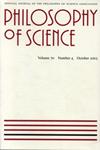地球工程技术在规避风险主体中的应用研究
IF 1.4
2区 哲学
Q1 HISTORY & PHILOSOPHY OF SCIENCE
引用次数: 0
摘要
在最近的一篇论文中,Winsberg(2021)通过古德定理支持对地球工程的研究,该定理指出,进行研究可以最大化一个人的预期效用。然而,这一结果有时对风险规避者无效(Buchak 2010)。由于风险规避抓住了地球工程批评者所共有的一些“预防性”直觉,因此,如果考虑到风险规避,地球工程研究是否会最大化一个人的效用是很重要的。我表明,在某些条件下,进行地球工程研究不会最大化风险加权预期效用。本文章由计算机程序翻译,如有差异,请以英文原文为准。
On the Utility of Research into Geoengineering Technologies for Risk-avoidant Agents
In a recent paper Winsberg (2021) argued in favor of research into geoengineering by relying on Good’s theorem, which states that conducting research maximizes one’s expected utility. However, this result sometimes fails for risk-avoidant agents (Buchak 2010). Since risk avoidance captures some of the ’precautionary’ intuitions that critics of geoengineering share, it is important to see if geoengineering research would maximize one’s utility if risk avoidance is taken into account. I show that under some conditions conducting geoengineering research would not maximize risk-weighted expected utility.
求助全文
通过发布文献求助,成功后即可免费获取论文全文。
去求助
来源期刊

Philosophy of Science
管理科学-科学史与科学哲学
CiteScore
3.10
自引率
5.90%
发文量
128
审稿时长
6-12 weeks
期刊介绍:
Since its inception in 1934, Philosophy of Science, along with its sponsoring society, the Philosophy of Science Association, has been dedicated to the furthering of studies and free discussion from diverse standpoints in the philosophy of science. The journal contains essays, discussion articles, and book reviews.
 求助内容:
求助内容: 应助结果提醒方式:
应助结果提醒方式:


